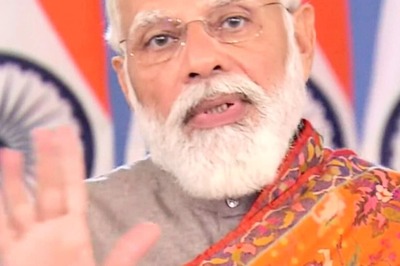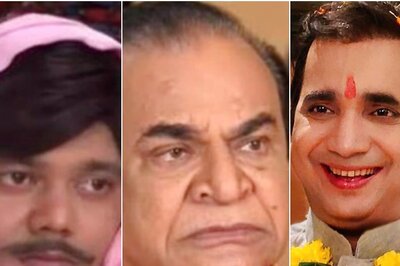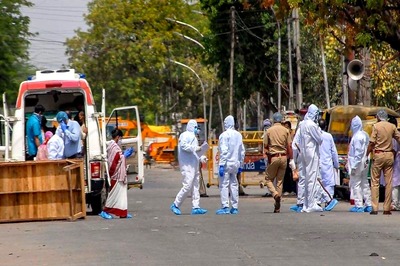
views
Rome: As riot police clashed with protesters in the streets, Italy's new premier unveiled his economic plan, vowing to spur growth yet spread out the sacrifices Italians must accept to save their country from bankruptcy and the eurozone from a disastrous collapse.
Mario Monti spoke to lawmakers on Thursday as anti-austerity protesters turned violent in Milan, Turin and in Sicily, signaling the depths of resistance the economist-turned-premier will have to overcome if his plan is to succeed.
He framed the situation in dire terms - if Italy cannot save itself, the 17-nation eurozone of which it is a founding member would be in catastrophic danger.
"The end of the euro would cause the disintegration of the united market, its rules, its institutions," the former European Union competition commissioner told the Senate ahead of a confidence vote on his one-day-old government. "The future of the euro also depends on what Italy will do in the next weeks. Also, not only."
Europe has already bailed out three small countries - Greece, Ireland and Portugal - but the Italian economy, the third-largest in the eurozone is too big for Europe to rescue. Yet borrowing rates for Italy rose briefly over 7 percent Thursday - a level that forced those other countries into bailouts. Italy's role in the eurozone is considered crucial for economic and political reasons - but it's not clear how much sacrifices already-stressed Italians are willing or able to make.
Monti assembled his new government Wednesday, shunning politicians and turning to fellow professors, bankers and business executives to fill key cabinet posts. But while he appealed in a calm, professorial tone Thursday for the country to pull together, protesters chanted anti-Monti slogans in the streets of Rome, Milan and Turin.
Milan police in riot gear wielded clubs as they scuffled with egg-throwing students who tried unsuccessfully to march to Bocconi University, which educates Italy's business elite. Monti is Bocconi's president.
"The government of the banks" read one placard held by a youth.
"Save schools, not banks!" read one banner raised by students in Milan in front of the Association of Italian Banks. Demonstrators chanted "Association of Italian bankrupters!"
Rome protester Titti Mazzacane was skeptical, even as she called Monti's choices "decent and competent people."
"(His government) is a little bit too free-market liberal. I am a bit scared," said the 53-year-old elementary school teacher.
Public schools have been hard hit by budget cuts from previous Italian governments.
Monti revealed plans to fight Italy's pervasive tax evasion, lower costs for companies so they can hire more and possibly lower taxes rates for women to encourage their increased participation in the work place. Hee warned Italians they must brace for more "sacrifices," including the probable return of a property tax on primary residences.
"We must convince the markets we have started going down the road of a lasting reduction in the ratio of public debt to GDP. And to reach this objective we have three fundamentals: budgetary rigor, growth and fairness," Monti said.
He said he would quickly work to lower Italy's staggering public debt, which now stands euro1.9 trillion ($2.6 trillion) - 120 percent of its GDP.
"But we won't be credible if we don't start to grow," Monti added.
His administration must restore confidence in the country's financial future and avoid contagion that would worsen the eurozone's debt crisis. Italy's spiraling financial crisis helped bring down media mogul Silvio Berlusconi's 3 1/2 year-old government last week, after it spent months squabbling over how to save Italy from financial ruin.
Monti's choice of unelected experts for his Cabinet and the prospect of tough reforms have fueled unrest. In cities from north to south, students clashed with police Thursday in protests against feared budget cuts, while transport strikes idled buses and trains.
In the Sicilian capital of Palermo, demonstrators hurled eggs and smoke bombs at a bank, and protesters threw rocks at police who battled back with pepper spray, the Italian news agency ANSA reported. One protester was injured. Police charged demonstrators who were trying to occupy another bank. Jobless youths joined students in the protests.
In Rome, hundreds of students protested outside Sapienza University, while others assembled near the main train station. No clashes were reported, but some protesters hurled eggs and oranges just blocks from the Senate.
Riot police in Turin reported several police injuries as they held back protesters trying to break through barriers.
Peaceful protests were held in Venice.
Last week, parliament gave final approval to an austerity package that reform pensions and cuts state spending. Monti, however, strongly suggested that much harsher medicine was needed to heal Italy's finances.
He indicated Italians would be paying new taxes. Italy's lack of a property tax on primary residences - Berlusconi eliminated the tax - is "a peculiarity, if not an anomaly" in Europe, Monti said.
Monti said if Italy fails to grow economically and unite in behind financial reforms, "the spontaneous evolution of the financial crisis will subject us all, above all the weakest, to far harsher conditions."
Berlusconi, who still is a lawmaker, told reporters that his People of Freedom party - the largest in parliament - would back Monti in the confidence vote and then decide measure by measure whether to back the government.
But he immediately ruled out any support for Monti's strategy to tax wealth or property, saying that would have a "negative psychological" impact on development.
Monti also pledged to tackle chronic and widespread tax evasion. Hiding or underreporting income by the self-employed is rampant in Italy, and workers with paychecks have long complained they bear an unfair share of the nation's high taxes.
Stefano Folli, a political analyst at the il Sole-24 Ore paper, viewed Monti's overture to the nation as more political than economic, aimed at convincing both Italians and the international community of his mission.
"The anti-crisis discussion was aimed at Italians to seek a season of sacrifices and rigor, and abroad to say Italy wants to gain credibility." Folli said.
Monti said his government would consider reforms to lower Italy's "elevated" tax rates. Employers say high payroll taxes discourage them from hiring.
In the workplace, Monti called for structural reforms but added "we must avoid the anguish that accompanies it."
The question of how long Monti's government will last has sparked intense debate among Italy's political parties. Monti has said he intends to govern until the legislative period expires in the spring 2013. But Berlusconi's longtime ally the Northern League wants elections earlier.
Sen. Roberto Calderoli, a Northern League leader, gave a "thumbs-down" signal at the end of Monti's speech.
Some in Berlusconi's conservative People of Freedom Party have called for early elections, but top party officials have said they will support Monti in parliament to achieve anti-crisis measures.
Monti indicated he was looking for wide support among Italians.
But Antonio Romano, who was distributing leaflets to protesters in Rome, said the government's strategy is "make the workers and retired people pay for the crisis, not those who provoked the crisis. I mean big business, bankers."
Strikes also hit several cities Thursday. A transit strike of several hours idled the subway system and many buses in Rome, and Milan suffered a similar walkout. Alitalia reduced flights due to a four-hour strike by air traffic controllers and airport workers.




















Comments
0 comment